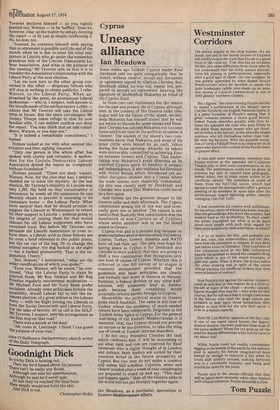Cyprus
Uneasy alliance
Ian Meadows
Some weeks ago Turkish Cypriot leader Rauf Denktash told me quite categorically that he would, without reserve, accept any document or agreement signed by Glafcos Clerides. But, Denktash added, he was not, repeat not, prepared to accept an agreement bearing the signature of Archbishop Makarios as Head of the Cypriot State.
In those two curt statements lies the reason for the past and present ills of Cyprus, although seen in the context of the Geneva talks they augur well for the future of the island. Archbishop Makarios has himself stated that he will not return to Nicosia for some weeks and President Clerides has advised Makarios not to come home until such time as the political situation is 'clearer.' The leaders of the island's two corn• munities know that Makarios and most of his inner circle were bound by an oath, taken during the Eoka uprising, whereby its takers were irrevocably committed to achieving Enosis between Greece and Cyprus. This undertaking was Makarios's great dilemma as he watched Cyprus grow to healthy if uneasy. self-independence. It also explains his flirtation with Soviet Russia which introduced yet another disruptive element into a Cyprus where the trade unions were staunchly communist. All this was clearly seen by Den ktash and Clerides who knew that Makarios could never be a free agent.
And therein lies the greatest danger to the Geneva talks and their aftermath. The Cyprus constitution sprang out of one war and eventually gave rise to another. The reason is not hard to find. Basically that constitution was the handiwork of non-Cypriots or of Cypriots whose secret ambition was to see the island joined to Greece.
Cyprus was and is a powder keg because so many outsiders were orarevinvolved. In Geneva, Cyprus, Turkey, Greece, America and NATO have all had their say. The only true hope for lasting peace in Cyprus is for Denktash and Clerides to state publicly that they are going to draft a new constitution that recognises only one kind of citizen of Cyprus. Whether this is achieved in one fell swoop or in stages is relatively unimportant provided that the guidelines and basic principles are clearly and formally laid down in Geneva or Nicosia. Partition, a federal division or any other halfsolution, will ultimately lead to further strife because these conditions would invariably involve parties foreign to Cyprus. Meanwhile the political scene in Greece looks much healthier. The same is not true of Turkey where the problems of much-needed reform have been temporarily forgotten as the Turkish Army fights in Cyprus. For the general well-being of the Eastern Mediterranean it is essential, vital, that Cyprus should not provide an excuse or be the diversion, to take the sting our of Greek or Turkish internal disorders.
I do not envy President Clerides the task which confronts 'him. It will be interesting to .see what rank and role are reserved for Rauf Denktash who is highly thought of in London and Ankara. Both leaders are united by their common belief in the future prosperity of Cyprus. But two men do not make a country and unless half-a-million Cypriots, wiser and clearer-headed after a week of near catastrophe are prepared to stand up and say, "This shall not happen again," then all the Geneva talks in the world will not put Humpty together again.
Ian Meadows, as a journalist, specialises in Eastern Mediterranean affairs.


































 Previous page
Previous page